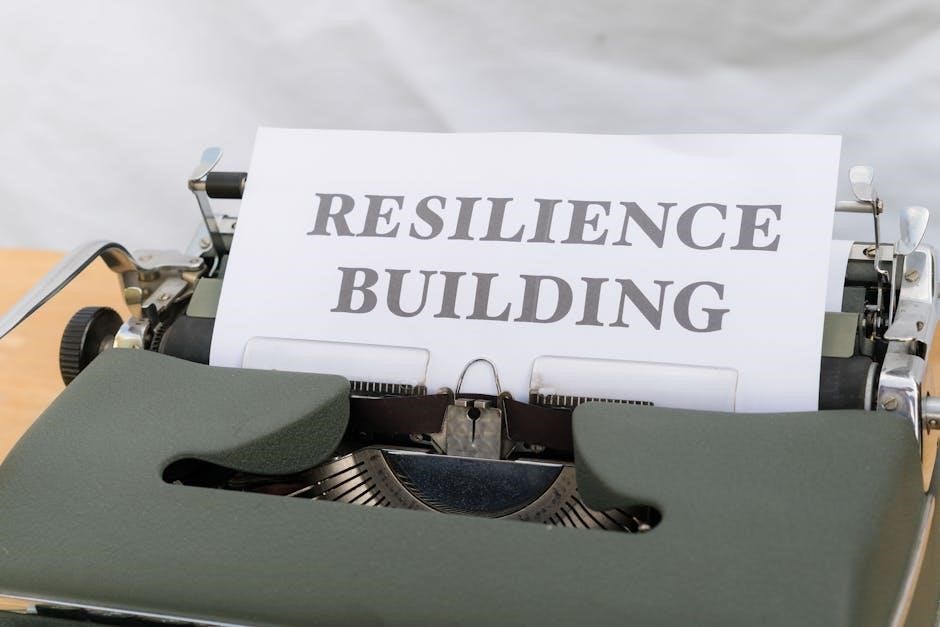coping skills for trauma pdf
Understanding trauma and its impact is crucial for developing effective coping strategies. Managing traumatic stress requires a blend of emotional resilience and practical tools, such as grounding techniques and creative expression, with resources like worksheets and journals aiding in progress tracking and skill development.
1.1 Understanding Trauma and Its Impact
Trauma refers to emotional or psychological distress caused by deeply distressing events, such as abuse, accidents, or loss. It disrupts an individual’s sense of safety and well-being, often leading to long-term mental health challenges like anxiety, depression, or PTSD. Understanding trauma involves recognizing how it affects emotional regulation, relationships, and daily functioning. The impact can manifest as heightened stress responses, difficulty trusting others, or avoidance of triggers. Trauma’s effects may also extend to physical health, causing chronic pain or sleep disturbances; Acknowledging these consequences is the first step toward healing and developing effective coping strategies to manage symptoms and rebuild resilience. Recognizing triggers and patterns is essential for creating a foundation for recovery.
1.2 The Importance of Coping Skills in Trauma Recovery
Coping skills are essential for navigating the complex journey of trauma recovery. They provide individuals with tools to manage overwhelming emotions, reduce stress, and rebuild a sense of control. Effective coping strategies, such as grounding techniques and creative expression, help individuals process traumatic experiences and regulate their emotional responses. Without healthy coping mechanisms, individuals may turn to negative behaviors or experience prolonged distress. Developing resilience through coping skills fosters emotional healing and improves overall well-being. Worksheets, journals, and therapy can guide individuals in identifying and practicing these strategies, empowering them to move forward from trauma and regain stability in their lives. These tools are vital for transforming challenging emotions into opportunities for growth and recovery.
Types of Coping Skills for Trauma
Coping skills for trauma include emotional strategies like mindfulness, physical techniques such as exercise, and social methods like seeking support, each addressing different aspects of recovery.
2.1 Emotional Coping Strategies
Emotional coping strategies focus on managing feelings and thoughts triggered by trauma. Techniques like mindfulness, grounding, and cognitive restructuring help individuals process emotions healthily. Mindfulness practices, such as deep breathing or meditation, reduce anxiety and promote calm. Grounding techniques, like the 5-4-3-2-1 method, anchor individuals in the present, easing emotional overwhelm. Cognitive restructuring involves challenging negative thoughts and replacing them with balanced, realistic ones. Journaling and expressive writing also allow individuals to explore and release emotions. These strategies empower individuals to regulate their emotional responses, fostering resilience and emotional well-being. Consistent practice of these methods can lead to long-term emotional stability and healthier ways of navigating traumatic stress.
2.2 Physical Coping Techniques
Physical coping techniques are essential for managing the bodily effects of trauma. Exercise, such as running, walking, or yoga, helps reduce stress and release endorphins, promoting emotional well-being. Progressive Muscle Relaxation (PMR) and stretching can alleviate physical tension caused by trauma; Sensory grounding techniques, like using specific smells or tactile activities, provide immediate comfort. These methods help individuals reconnect with their bodies and regulate their nervous system. Regular physical activity not only improves mental health but also enhances overall resilience. By incorporating these techniques into daily routines, individuals can better manage traumatic stress and maintain physical and emotional balance. These practices are accessible and effective, making them valuable tools for trauma recovery;
2.3 Social and Relational Coping Skills
Social and relational coping skills are vital for trauma recovery, as they foster connection and support. Building a strong support network with trusted friends, family, or therapists can provide emotional validation and practical assistance. Engaging in group activities or joining peer support groups helps individuals feel less isolated and more understood. Effective communication, such as expressing feelings openly, is key to rebuilding trust and relationships. Additionally, learning to set healthy boundaries protects emotional well-being. These skills not only enhance interpersonal connections but also strengthen resilience, enabling individuals to navigate challenging situations with greater confidence. By leveraging social support, individuals can create a nurturing environment that promotes healing and growth.

Effective Strategies for Managing Traumatic Stress
Effective strategies include grounding techniques, cognitive-behavioral methods, and creative expression to manage traumatic stress. Worksheets and journals can track progress and develop resilience, aiding recovery.

3.1 Grounding Techniques for Immediate Relief
Grounding techniques offer immediate relief from traumatic stress by refocusing attention on the present moment. Methods like deep breathing, the 5-4-3-2-1 exercise, or sensory exploration help calm the nervous system. These practices interrupt flashbacks or overwhelming emotions, providing a sense of control and safety. For example, deep breathing slows heart rate and reduces anxiety, while the 5-4-3-2-1 technique encourages awareness of surroundings, distracting from distressing thoughts. Grounding techniques are portable, discrete, and can be used anywhere, making them invaluable for managing triggers in real-time. Regular practice strengthens emotional resilience and enhances the ability to cope with traumatic memories or environments.
3.2 Cognitive-Behavioral Techniques for Long-Term Recovery
Cognitive-behavioral techniques (CBT) are powerful tools for long-term trauma recovery, focusing on identifying and modifying negative thought patterns. By addressing unhelpful beliefs and behaviors, individuals can reduce anxiety and improve emotional regulation. Techniques like cognitive restructuring and behavioral activation help individuals challenge distorted perceptions and engage in activities that promote well-being. These methods are evidence-based and often used in therapy to address PTSD symptoms. Worksheets and journals are commonly used to track progress and reinforce new skills. Over time, CBT empowers individuals to manage triggers more effectively, fostering resilience and long-term emotional healing. Regular practice of these techniques can lead to lasting changes in how trauma is processed and managed.
3.3 Creative Expression as a Healing Tool
Creative expression is a powerful tool for healing from trauma, offering individuals a healthy outlet to process emotions and rebuild resilience. Activities like journaling, art, music, and writing provide a safe space to explore and communicate feelings that may be difficult to express verbally. For example, journaling helps identify triggers and track progress, while art allows non-verbal expression of complex emotions. These activities foster self-awareness, reduce stress, and promote emotional regulation. By engaging in creative practices, individuals can transform painful experiences into meaningful expressions, gaining a sense of control and empowerment. Creative expression complements other coping strategies, offering a holistic approach to trauma recovery and personal growth. It encourages individuals to channel their experiences into constructive and healing outcomes.

Special Considerations for Different Populations
Trauma recovery varies across populations; teens, children, and veterans require tailored strategies to address unique needs, ensuring effective coping mechanisms and support systems are accessible and appropriate.
4.1 Coping Skills for Teens and Adolescents
Teens and adolescents often face unique challenges in managing trauma due to their developmental stage. Books and resources specifically designed for this age group can help them understand and cope with stress, anxiety, and anger. Tools like worksheets and journals encourage self-reflection and emotional regulation. Engaging in activities such as exercise, writing poetry, or drawing can provide healthy outlets for expression. Additionally, social support from peers and adults plays a crucial role in their recovery. Professional guidance, including therapy, can offer tailored strategies to address their specific needs. By fostering resilience and providing accessible resources, teens can develop the skills necessary to navigate traumatic experiences effectively.
4.2 Trauma Recovery in Children
Trauma recovery in children requires a sensitive and age-appropriate approach. Techniques like play therapy and art activities help young children express emotions they cannot verbalize. Cognitive-behavioral tools, adapted for their developmental level, assist in processing traumatic experiences. Creating a safe and supportive environment is essential, emphasizing trust and consistency. Parents and caregivers play a vital role in fostering resilience by modeling healthy coping behaviors. Educational resources and therapy options tailored for children ensure they receive the specific support they need. These strategies promote emotional healing and equip children with skills to manage stress and anxiety effectively, laying a foundation for long-term well-being.

4.3 Coping Strategies for Veterans and First Responders
Veterans and first responders often face unique challenges due to their exposure to high-stress and traumatic situations. Effective coping strategies include grounding techniques to manage flashbacks and peer support groups to foster connection and understanding. Cognitive-behavioral techniques, such as identifying and challenging negative thoughts, can help reduce symptoms of PTSD. Physical activity, mindfulness, and structured routines also play a role in promoting emotional and mental well-being. Professional support, such as trauma-focused therapy, is crucial for addressing deeper issues. Additionally, resources like worksheets and journals can help track progress and develop resilience. These strategies empower individuals to process their experiences and reintegrate into daily life with greater ease and confidence.
Practical Tools and Resources
Key tools include worksheets and journals for tracking progress, alongside support systems and therapy options. These resources help individuals identify triggers, explore coping strategies, and build resilience effectively.
5.1 Worksheets and Journals for Tracking Progress
Worksheets and journals are powerful tools for managing trauma and tracking progress. They help individuals identify emotional triggers, explore coping strategies, and regulate their nervous system. By documenting feelings and thoughts, users can gain insights into patterns and develop healthier responses. Worksheets often include exercises to practice grounding techniques, while journals encourage daily reflection on experiences and resilience-building activities. These tools provide a structured way to process trauma, fostering consistency and accountability. Over time, they empower individuals to recognize improvements and refine their coping skills, ultimately enhancing their ability to navigate challenging emotions and situations. Regular use of these resources can significantly support long-term recovery and personal growth.
5.2 Support Systems and Therapy Options
Building a strong support system is vital for trauma recovery. Professional guidance from therapists or counselors can provide tailored strategies and a safe space to process emotions. Cognitive-behavioral therapy (CBT) and trauma-focused therapies are effective options for addressing traumatic stress. Support groups, both in-person and online, offer a sense of community and shared understanding, helping individuals feel less isolated. Additionally, peer support networks and online forums can provide ongoing encouragement and resources. These systems complement personal coping skills, fostering resilience and promoting long-term healing. Engaging with a therapist or support group can significantly enhance the effectiveness of other coping strategies, such as grounding techniques or creative expression, leading to a more holistic recovery journey.
Coping skills are essential for trauma recovery, offering emotional resilience and practical tools. Utilize resources like worksheets and support systems to foster continued growth and healing effectively.
